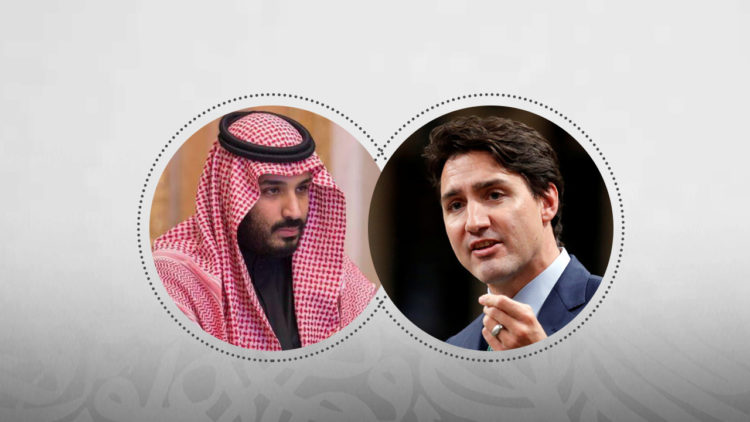Analysis/How the Saudis Made Canada the Loneliest Country in the World
زيفي برئيل من الهآررتس: كيف حولت السعودية كندا إلى دولة معزولة في العالم
Zvi Bar’el/Haaretz/August 27/18
Western leaders wooing Saudi money aren’t going to nag the crown prince about Riyadh’s executions of human rights activists
“If it is comparatively easy for the Saudis to lash out at Canada, a relatively small trading partner, they might be given more pause if criticism came from countries on which they are more reliant – not least the United States, which under Donald Trump has fostered a relationship cozier than ever,” the Canadian daily The Globe and Mail wrote in an editorial.
The paper, like the Canadian people, isn’t angry only at Riyadh, which plans to execute Israa al-Ghomgham, a young Shi’ite woman arrested in 2015 on charges of participating in a demonstration for Shi’ite rights. It’s also angry at the deafening silence of other world leaders.
Two weeks ago, Canada boldly announced that it was “extremely concerned” about the recent arrests of human rights activists in Saudi Arabia. As a result, it suffered a resounding blow from Saudi Crown Prince Mohammed bin Salman: He ordered the Canadian ambassador to leave the country in 24 hours, imposed an economic boycott on Canada and told Saudi students in Canada to come home.
“The Canadian statement is a blatant interference in the Kingdom’s domestic affairs,” the Saudi Foreign Ministry said in a statement. “It is a major, unacceptable affront to the Kingdom’s laws and judicial process, as well as a violation of the Kingdom’s sovereignty.”
Canada has now become the loneliest country in the world.
The West’s excitement over the crown prince’s decision to let women drive; his arrests on corruption charges of several billionaires, including members of the ruling family; and his effort to enact religious reforms in the kingdom, which have included arrests of members of the morality police, all led experts on Saudi Arabia to talk about a new era under a leader whom other Arab states might see as a model. New York Times columnist Thomas Friedman, who interviewed the crown prince a year ago, went overboard in praising the young leader.
But following the recent wave of arrests, including of women who demonstrated against the law requiring women to have male guardians, it seems unlikely that Friedman would reiterate his flattering words.
In a Twitter account in which Saudi women demand the abolition of guardianship, you can view a short video showing two Saudi women garbed in black from head to toe. As the caption puts it: That’s how they want the Saudi woman. They fear she’ll seduce them and rouse their desire, because they’re like animals.
The account won a supportive comment from a man named Hassan al-Baladi, who wrote that women aren’t the only ones seeking to abolish the guardianship laws. “We’re ashamed that our female partners in the homeland are excluded and humiliated under a regime built by men obsessed with honor,” he said. “Honor means not oppressing anyone.”
People who make comments like that have become targets of persecution. Recently, the regime blocked web users from accessing the Nasawiya online radio station that broadcasts from outside Saudi Arabia because the station urged women to hold an open, critical conversation about male guardianship.
Iran is still beating Saudi Arabia in the competition over which country can do more harm to human rights, but Riyadh appears to be closing the gap. Last year, Iran executed 507 people, while Saudi Arabia executed 147.
In Saudi Arabia, executioners are government officials defined as “religious functionaries.” They require no qualifications beyond the physical ability to lop off heads or limbs (depending on the verdict). Three years ago, the government announced that it was seeking to hire eight new executioners; the announcement included instructions for how to download application forms from the web.
Executioners earn a bonus of $1,000 per head on top of their regular salary, which comes to about $400 a month. They can also hold second jobs – for instance, as jailers, who earn between $2,000 and $4,000 a month.
But unlike Iran, Saudi Arabia is considered pro-Western. Even more important, it’s a major customer for American and European defense contractors.
Last year it signed a contract to buy $110 billion in military equipment from the United States. In 2016 it bought more than 790 million pounds ($1 billion) in arms from the European Union, and this year it signed a contract to buy 48 British fighter jets at a cost of billions of dollars.
With fat contracts like these, no Western country will risk criticizing the kingdom’s human rights violations. It’s unrealistic to expect leaders who are wooing the crown prince’s money to nag him about indictments of human rights activists or pressure him to commute the death penalty imposed on Ghomgham and others like her.
The rise of a new generation of young Arab leaders starting in the late ‘90s gave many people hope similar to that inspired by the Arab Spring. But so far, these young leaders have merely become older leaders who are continuing their fathers’ legacy.
“The system” and the traditions of control are apparently stronger than the leaders. And the Saudi crown prince has yet to prove himself an exception to this rule.






















